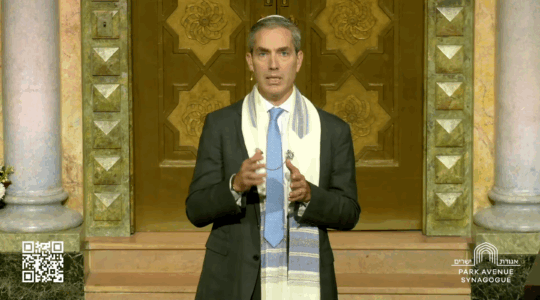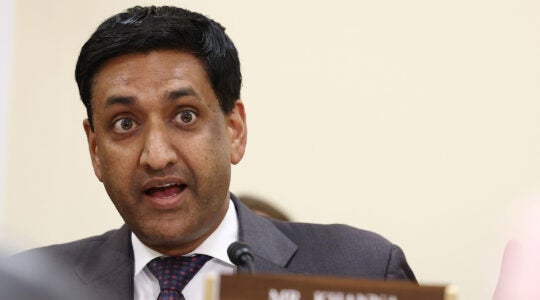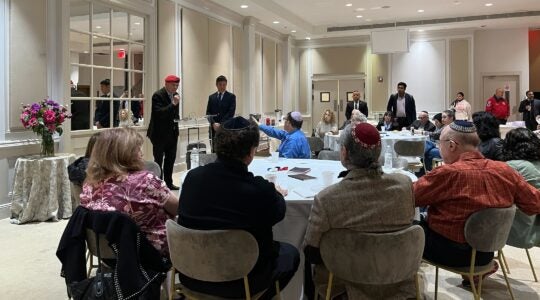WASHINGTON (JTA) — President Obama has shown Iran the carrot and now Congress wants to wave the stick.
In perhaps the most substantial volley emanating from pro-Israel forces who hope to contain Iran’s alleged nuclear weapons plans, several of the most senior and powerful Democrats in the U.S. Congress sent a letter to the president last week urging stepped-up action.
Signed by several key Democratic lawmakers, including Rep. Steny Hoyer (D-Md.), the House of Representatives majority leader, the letter backs the Obama administration’s pledge to pursue talks with Iran, but insists that engagement must be “serious and credible,” and not “open-ended.”
Talks should be launched “as soon as possible,” the letter states, and if they fail to produce results quickly, then Obama should use executive orders to implement various sanctions. Obama had backed some of the sanctions last year when he was a U.S. senator and running for president.
The American Israel Public Affairs Committee strongly praised the letter.
“This is an important letter and one that AIPAC applauds,” spokesman Josh Block said. “It expresses support for current efforts to create the opportunity for constructive engagement should Iran choose to comply with international demands, but also strongly makes the point that it cannot be an open-ended process that Iran exploits, and should that effort fail, the president must be prepared to impose crippling economic sanctions on Iran to create the leverage needed to change their behavior.”
The letter was sent within days of Obama’s most dramatic attempt yet at outreach to Tehran: a March 20 video message marking Nowruz, the secular Iranian new year.
In that message, the president made good on his campaign promise to end former President George W. Bush’s policy of keeping outreach to Iran to the minimum dictated by cooperation on such regional trouble spots as Iraq and Afghanistan.
“I would like to speak clearly to Iran’s leaders,” Obama said. “We have serious differences that have grown over time. My administration is now committed to diplomacy that addresses the full range of issues before us, and to pursuing constructive ties among the United States, Iran and the international community. This process will not be advanced by threats. We seek instead engagement that is honest and grounded in mutual respect.”
Obama had spoken during his campaign of “bigger carrots and bigger sticks” when it comes to Iran policy. Israel and its allies in Washington have not begrudged the carrot, if only because the Bush administration’s isolation policy ultimately failed to halt the nuclear weapons program.
But the letter from top Democrats, as well as separate initiatives from Republicans, is a signal that Congress wants to see how big the stick is.
The Democrats proposed “sanctioning the Central Bank of Iran; sanctioning international banks that continue to do business with Iranian banks; denying access to American ports to shipping companies whose ships call on Iranian ports; sanctioning insurance companies that insure vessels calling on Iranian ports or that insure aircraft landing at Iranian airports; sanctioning energy companies investing in Iran’s oil and gas sector.”
It is not clear how Obama feels about such sanctions; he has yet to announce a sanctions policy. Significantly, Dennis Ross, who is shaping the policy, was the most articulate defender of the “bigger stick” strategy during the campaign, specifying the insurance and energy sector strategies.
This week, Ross added to his team two former colleagues from the Washington Institute for Near East Policy, a think tank where sympathy for toughened sanctions runs strong.
It might be hard for Obama to turn away such suggestions. Through proxies such as Ross and Daniel Shapiro, now a chief Middle East officer at the National Security Council, his campaign vociferously backed everything in Hoyer’s letter but the suggestion about the ports.
The letter was signed by some of the most powerful committee chairmen in Congress: Reps. Howard Berman (D-Calif.) of foreign affairs, Henry Waxman (D-Calif.) of energy, Ike Skelton (D-Mo.) of armed services and Sylvestre Reyes (D-Texas) of intelligence. The other two signatories are Reps. Robert Wexler (D-Fla.), who chairs the Europe subcommittee and was Obama’s most avid Jewish backer during the campaign, and Gary Ackerman (D-N.Y.), who chairs the Middle East subcommittee.
Wexler suggested a good cop-bad cop dynamic coordinated with the White House.
“All of us believe that the policy we stated will be incorporated fully into the Obama administration’s policy,” he told JTA. “It’s important to have a strong statement outlining an Iranian policy from staunchly pro-Israel members of Congress. In my discussions with people at the National Security Council as well as at the State Department, I am 100 percent confident that the policy as stated in our letter will resemble greatly the policy implemented by the Obama administration.”
Republicans have launched similar initiatives. Missouri Rep. Roy Blunt, the former House minority leader, wrote Secretary of State Hillary Rodham Clinton asking her to explain how she is applying existing sanctions that were renewed earlier this month by Obama for another year. Florida Rep. Ileana Ros-Lehtinen, the senior Republican on Berman’s Foreign Affairs Committee, has introduced legislation to expand sanctions. In the Senate, Louisiana Sen. David Vitter wants the Securities and Exchange Commission to force companies to disclose whether they do business with Iran.
Trita Parsi, who directs the National Iranian American Council — the lead organization in an ad hoc group of scholars and policy advocates who favor outreach — says the “stick” has its place but diplomacy should come first.
“I can understand that Congress wants to play this role — Congress is often the entity that doesn’t have anything but sticks,” he said, referring to Congress’ reactive role when it comes to foreign policy. “But any effort to ramp this up in the middle of efforts for diplomacy further poisons the atmosphere and reduces the chances for diplomacy.”
Parsi suggested imagining turned tables, asking “How would we take it if the Iranians say we want to increase diplomacy, but let’s increase activity by Hamas and Hezbollah” — Iranian-backed terrorist groups — “as leverage?”
JTA has documented Jewish history in real-time for over a century. Keep our journalism strong by joining us in supporting independent, award-winning reporting.





